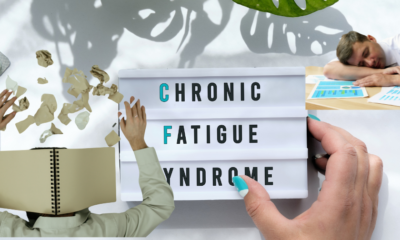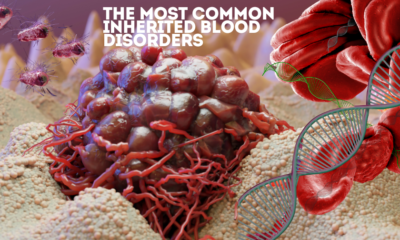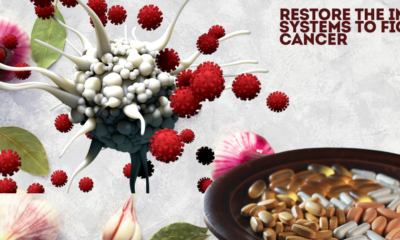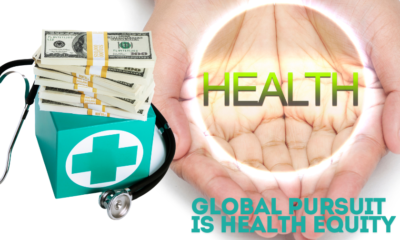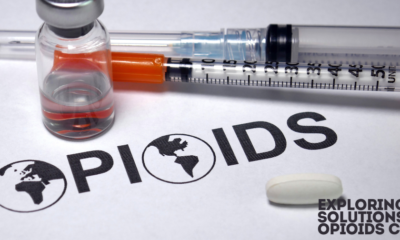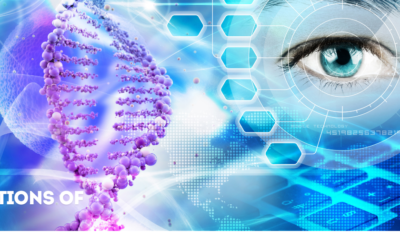Health & Fitness
Women’s Health Issues: From Menstruation to Menopause – What to Expect

Women’s health is a broad and intricate field that spans the entire lifecycle, encompassing various physiological and psychological dimensions. From the onset of menstruation in adolescence to the transformative years of menopause, women experience numerous health changes that require a unique and comprehensive approach. Understanding these transitions is essential for promoting optimal health outcomes, breaking down societal stigmas, and empowering women to make informed decisions about their bodies. This article delves into the various phases of women’s health, from menstruation to menopause, exploring what to expect, the challenges encountered, and how to navigate these life stages.
1) Menstruation: The Beginning of the Reproductive Journey
What is Menstruation?
Menstruation is a natural biological process marking the onset of puberty in females, typically occurring between the ages of 11 and 14, although it can start earlier or later. It involves the monthly shedding of the uterine lining, known as the endometrium when there is no fertilized egg. This process is part of the menstrual cycle, which is usually 28 days long but can range from 21 to 35 days.
Physical and Emotional Changes
The start of menstruation, or menarche, signifies the beginning of a young girl’s reproductive years and brings a host of physical and emotional changes. These changes are primarily driven by hormonal fluctuations, particularly estrogen and progesterone. Physical symptoms can include:
- Cramps (Dysmenorrhea): Painful cramps are caused by the contraction of the uterus to expel its lining. For some, these can be mild, but for others, they can be debilitating.
- Breast Tenderness: Hormonal changes can lead to swollen and tender breasts.
- Bloating and Weight Gain: Water retention and changes in bowel movements can cause bloating.
- Acne: Hormonal imbalances can trigger sebaceous glands to produce more oil, leading to acne outbreaks.
Emotional changes can range from mood swings, irritability, and anxiety to depression. These are often part of a condition known as Premenstrual Syndrome (PMS), which affects a significant number of menstruating women.
Common Menstrual Disorders
While menstruation is a natural process, many women experience menstrual disorders that affect their quality of life:
- Amenorrhea: The absence of menstruation, either primary (never had a period) or secondary (absence for three or more months).
- Menorrhagia: Heavy or prolonged menstrual bleeding that can cause anemia.
Premenstrual Dysphoric Disorder (PMDD): A severe form of PMS that can significantly impair daily functioning.
Managing Menstrual Health
Effective management of menstrual health is crucial for the well-being of adolescent girls and women. This includes:
- Education and Awareness: Understanding the menstrual cycle and recognizing abnormal patterns.
- Nutrition and Exercise: Maintaining a balanced diet rich in iron and regular exercise can alleviate symptoms.
- Medical Interventions: For severe cases like PMDD or menorrhagia, medical interventions such as hormonal contraceptives or surgery may be necessary.
2) Reproductive Health and Fertility
Understanding Reproductive Health
Reproductive health encompasses a wide range of issues, including fertility, conception, contraception, pregnancy, and sexually transmitted infections (STIs). During the reproductive years (typically from ages 15 to 49), women may experience various challenges that affect their overall health and fertility.
Fertility Issues
Fertility is a significant concern for many women, especially those trying to conceive. Various factors can influence fertility, including:
- Age: Fertility naturally declines with age, with a more significant drop after 35.
- Polycystic Ovary Syndrome (PCOS): A hormonal disorder affecting ovulation, leading to irregular periods and infertility.
- Endometriosis: A painful condition where the tissue lining the uterus grows outside of it, causing infertility in severe cases.
- Uterine Fibroids: Non-cancerous growths that can cause heavy bleeding, pain, and infertility.
Contraception and Family Planning
Access to reliable contraception is essential for enabling women to plan their families and careers effectively. A variety of contraceptive options are available, ranging from hormonal methods (e.g., pills, intrauterine devices, implants) to barrier methods (e.g., condoms) and natural family planning techniques. It is vital for women to have access to accurate information and healthcare services to make informed choices.
Sexually Transmitted Infections (STIs)
Women are disproportionately affected by STIs compared to men, which can have severe reproductive health consequences if left untreated, such as pelvic inflammatory disease (PID) and infertility. Regular screening, safe sex practices, and education are crucial to prevention and early treatment.
3) Pregnancy and Maternal Health
The Journey of Pregnancy
Pregnancy is a transformative period that brings significant physical, emotional, and social changes. The journey from conception to childbirth involves three trimesters, each marked by distinct physiological developments and potential complications.
- First Trimester (Weeks 1–12): Hormonal changes lead to symptoms like nausea (morning sickness), fatigue, and breast tenderness.
- Second Trimester (Weeks 13–26): Physical changes become more apparent, with the belly expanding as the fetus grows.
- Third Trimester (Weeks 27–40): The body prepares for childbirth, and symptoms like back pain, heartburn, and insomnia may occur.
Common Pregnancy Complications
While many pregnancies are uneventful, some women may face complications that require medical attention:
- Gestational Diabetes: High blood sugar levels during pregnancy can pose risks to both mother and baby.
- Preeclampsia: A potentially dangerous condition characterized by high blood pressure and protein in the urine.
- Miscarriage: Loss of pregnancy before 20 weeks, often due to genetic abnormalities.
Maternal Health and Well-being
Maternal health is a critical aspect of women’s health that requires holistic care. This includes prenatal care, proper nutrition, exercise, mental health support, and postpartum care. The World Health Organization (WHO) emphasizes the importance of skilled care during childbirth to prevent complications and ensure the safety of both mother and baby.
4) Perimenopause: The Transitional Phase
Understanding Perimenopause
Perimenopause, often referred to as the “menopausal transition,” typically begins in a woman’s 40s but can start earlier. It is characterized by fluctuating hormone levels, particularly estrogen, which can cause a variety of symptoms that may last for several years.
Common Symptoms of Perimenopause
- Irregular Periods: The menstrual cycle may become unpredictable, with periods becoming lighter, heavier, shorter, or longer.
- Hot Flashes and Night Sweats: Sudden feelings of heat, particularly in the upper body, are common and can disrupt sleep.
- Mood Changes: Hormonal fluctuations can lead to irritability, anxiety, or depression.
- Sleep Disturbances: Insomnia or frequent waking during the night is common.
- Vaginal Dryness: Decreased estrogen levels can cause vaginal dryness, discomfort during intercourse, and increased risk of infections.
Managing Perimenopause Symptoms
Management of perimenopausal symptoms is highly individualized and may include lifestyle changes, dietary adjustments, and medical interventions such as hormone replacement therapy (HRT). Regular exercise, a healthy diet, and stress management techniques like yoga and meditation can also help alleviate symptoms.
5) Menopause: The End of Reproductive Years
What is Menopause?
Menopause is defined as the cessation of menstrual periods for 12 consecutive months, marking the end of a woman’s reproductive years. The average age of menopause is 51, but it can vary widely. Menopause is a natural biological process but can bring significant changes that affect physical and emotional well-being.
Physical and Emotional Changes During Menopause
- Hot Flashes and Night Sweats: These are among the most common symptoms, affecting up to 75% of women.
- Bone Density Loss: Reduced estrogen levels can lead to decreased bone density, increasing the risk of osteoporosis and fractures.
- Cardiovascular Changes: The risk of heart disease increases post-menopause due to changes in cholesterol levels and blood pressure.
- Urogenital Atrophy: Decreased estrogen can lead to thinning of the vaginal walls, urinary incontinence, and increased susceptibility to infections.
- Cognitive Changes: Some women report memory lapses or difficulty concentrating, though these are usually temporary.
Long-term Health Considerations
- Osteoporosis: Postmenopausal women are at higher risk of developing osteoporosis due to decreased bone density. Calcium and vitamin D intake, along with weight-bearing exercises, are essential for bone health.
- Heart Health: The decline in estrogen levels is associated with an increased risk of cardiovascular diseases. Regular check-ups, a healthy diet, and exercise are crucial preventive measures.
- Mental Health: The psychological impact of menopause should not be overlooked. Anxiety, depression, and mood swings can affect the quality of life, necessitating support and, in some cases, counseling or medication.
Hormone Replacement Therapy (HRT)
Hormone Replacement Therapy can be an effective treatment for relieving menopausal symptoms and preventing bone loss. However, HRT is not without risks, including an increased risk of breast cancer, blood clots, and stroke. Decisions about HRT should be made in consultation with a healthcare provider, considering the individual’s medical history and risk factors.
6) Post-Menopausal Health and Aging
Health Beyond Menopause
Post-menopausal health is an essential aspect of women’s health that requires ongoing attention. As women age, they may face an increased risk of several conditions, including cardiovascular diseases, osteoporosis, diabetes, and cancer. Maintaining a healthy lifestyle becomes more critical than ever to mitigate these risks.
Promoting Healthy Aging
- Nutrition: A balanced diet rich in calcium, vitamin D, and antioxidants is vital for maintaining bone health, reducing inflammation, and preventing chronic diseases.
- Exercise: Regular physical activity, including strength training, aerobic exercises, and flexibility workouts, is essential for overall health and longevity.
- Mental Health: Cognitive function can decline with age, but activities that challenge the brain, such as puzzles, reading, and social engagement, can help maintain mental acuity.
7) The Importance of Regular Health Check-ups
Regular health screenings are crucial for early detection and management of potential health issues at any stage of life. These include:
- Pap Smears and HPV Testing: Essential for detecting cervical cancer.
- Mammograms: Recommended for early detection of breast cancer, especially for women over 40.
- Bone Density Tests: Important for detecting osteoporosis risk, particularly post-menopause.
- Blood Pressure and Cholesterol Checks: Vital for cardiovascular health.
8) Addressing Stigma and Promoting Women’s Health Education
Despite advances in medical science and women’s health awareness, there remains a significant stigma around menstruation, reproductive health, and menopause. These taboos can prevent women from seeking help, discussing their symptoms, or accessing proper care. Promoting women’s health education in schools, communities, and workplaces is crucial to breaking down these barriers. Empowering women with knowledge about their bodies fosters a culture of openness, acceptance, and support.
Conclusion: Embracing the Full Spectrum of Women’s Health
Women’s health is a complex and dynamic field that spans the entire life cycle, from the onset of menstruation through the reproductive years, menopause, and beyond. Each phase brings unique challenges and changes that require individualized care, understanding, and support. By fostering a comprehensive approach that includes education, regular health check-ups, lifestyle modifications, and access to healthcare, we can empower women to take control of their health, embrace the natural transitions of life, and thrive at every stage.






